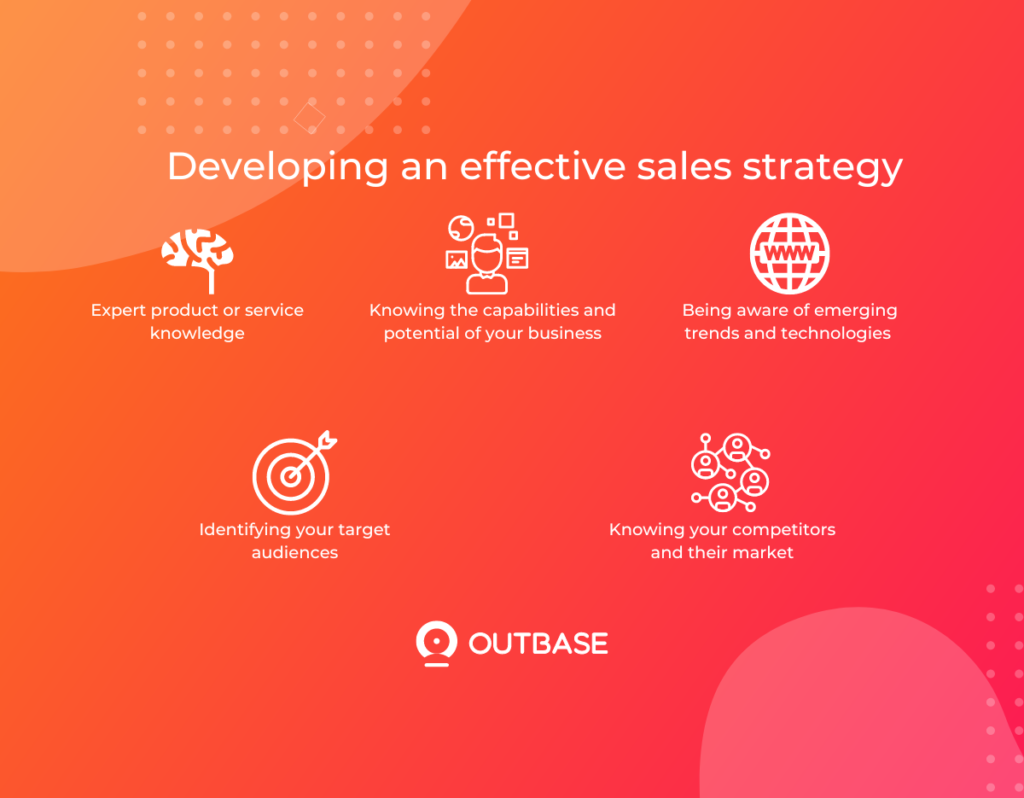Outbase will be closing down from 31st October 2024. Thanks for your support along the way, if you have any questions please contact us before then on the chat below


Sales intelligence is not a new concept, and you’ve probably heard the term before, but it’s no good hearing about a concept if you can’t use it to its full potential. And trust us, sales intelligence has huge potential. Or should we say, it can increase the potential of your business.
With such a big push on personalised contact, to the point where businesses now expect a prospecting email to be personalised, there’s even more emphasis on getting the highest lead quality possible. It can all be rather time-consuming and can take a lot of effort to research and personalise for every prospecting email – that’s where sales intelligence comes in.
Sales intelligence is the act of using techniques and technologies to collect in-depth data about your clients, both existing and prospective. It allows you to not only monitor their activity, but further understand them, meaning you can then increase qualified leads. It’s all about using data to improve sales and conversion rate in a meticulous and clever way.
What’s more? Sales intelligence has quite a broad meaning, which is because it can be (and should be) catered to your business and personalised for you. It can act as a catalyst throughout the sales process, allowing salespeople to focus their time and energy on the right thing – converting prospects. It should begin right at the start of your sales strategy, and continue through the process of finding your target audience, and using buying signals to inform your prospecting. Good sales intelligence is well organised and uses real-time data.
Let’s delve deeper into understanding how sales intelligence can improve lead quality by focusing on these points.
There are many elements to developing an effective sales strategy.

Sales intelligence can help streamline the process and keep it up to date. For example, it can help keep track of emerging trends or technologies, and keep tabs on competitors, allowing you to recognise these patterns and adapt your business to account for these changes. It also means that manpower which would be spent researching can be put into a more useful role.
In order to get the most out of sales intelligence, you should know your buyer persona like the back of your hand. Not only does this tie into our previous sales strategy point, but it also means you can streamline the sales process.
Your buyer persona is the ideal customer or client you want to be buying your product. They are all the best parts of your current clients, and are right in the middle of your target audience. It’s incredibly hard to sell to a client who is not in your target audience, and there’s simply no point in making a sale harder than it already is.
Knowing your buyer persona allows sales intelligence to pick up on buying signals, and means you can use the sales intelligence data to highlight how your product or service can help that particular customer. You can personalise questions and create a specific buying urgency to close sales with the right customers.
Buyer signals are any signals made by the prospect that indicate they could begin the buying process, or are interested in your product. Just like a certain smell can trigger a memory, certain clicks or actions trigger a buying signal that sales intelligence can pick up on.
Depending on your business, buying signals can come in many different shapes and sizes, and generally begin at buyer awareness, moving through to consideration, to buying signals at the other side.
Buyer awareness can be seen through:
Buyer consideration moves to:
Buying signals include:
The reason for so much emphasis on buying signals is that with sales intelligence, the need to hunt for these signals yourself is taken off your shoulders. Sales intelligence can collect data in many different ways, and one of these can be buying signals. As sales intelligence collects more of this data, it becomes more intelligent and can help you predict your prospect’s next moves, allowing you to close a sale more efficiently.
As we previously mentioned, sales intelligence can collect various types of data from various places, depending on what is suitable for your business. This includes (but isn’t limited to):
Collecting data in various formats, and from various places, will likely lead to more prospects, and a high lead quality. This means you can convert more prospects, and spend more time on qualified leads.
Real-time data is vital in using sales intelligence to its highest advantage. There’s no point in gaining such detailed insight into prospects and customers if you cannot act on them in real time. Particularly with such fast-paced aspects of prospecting, like social media, if you don’t act straight away, you’ll lose the prospect.
Sales intelligence can work constantly, without the need for breaks – instead of spending time updating what you know manually, sales intelligence does it automatically, and to a higher level of detail. If you can approach a prospect with a need before any other competitors have the chance to, your chances of closing the sale are significantly higher. Time is of the essence.
There’s little point in having such great sales intelligence data if it is not organised or easy to find – it should not be a task in itself to find said data. Incorporating sales intelligence into your CRM or sales engagement platform will keep all your data together and organised in a way that makes sense. This will allow salespeople to complete meaningful actions, engage with prospects and close sales more efficiently.
Sales intelligence can improve sales in a multitude of ways, from improving your sales strategy, to identifying your buyer persona and buying signals. Using real-time data from multiple sources, and cohesive organisation in a CRM or sales engagement platform emphasises how reliable and useful it can be.
Outbase has a variety of data sources with inbuilt sales intelligence to give you a good picture of your prospects, and fully integrates with Hubspot. Users can add to it by collating sales and customer data, such as website, cookies, and social media data, allowing you to identify more qualified leads and drive more sales. Skyrocket your sales.
Want to know more? Sign up today.